Determinants of good oral communication skills for the improvement of advanced program students’ classroom oral presentation performance at thai nguyen university of agriculture and forestry
Currently, oral presentation is one of the basic
and important skills in the students’ studies. This
skill is very significant for students and in
particular those who take foreign languages
because learning a foreign language requires
learners’ development of confidence and enhances
initiative. Additionally, it is a skill valuable for
application in future jobs and of course in daily life;
especially when English is nowadays considered as
a global language. It is a bridge which helps people
from different countries; different languages
understand each other, since the main purpose of
language is communicating. Through the use of
English, people can see the view of others; can
exchange ideas, opinions and thoughts.
Presentation skills are important and crucial for
students. It is applied to many fields of life in
studies, job interview, and teaching. Oral
presentations represent an opportunity for
developing real-world communications as well as
leadership skills [2]. Strong soft skill as oral
presentation skill is an essential skill to obtain a job
and thereby succeed in job career at workplace [3].
Owning good presentation skills means that
students have good communication skills; they
must have confidence when presenting something
in front of a crowd; and, they can use language
effectively in certain situations.
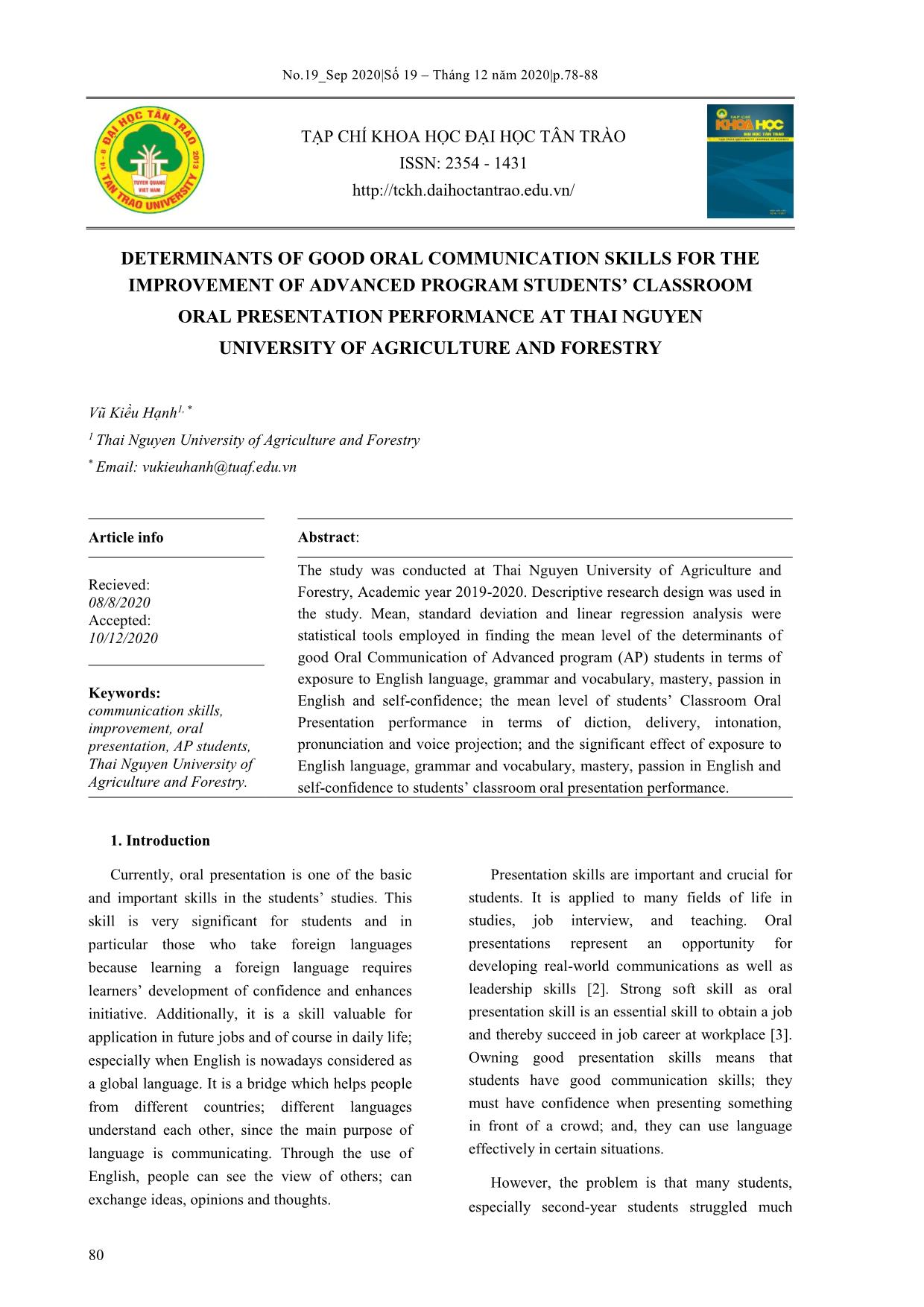
Trang 1
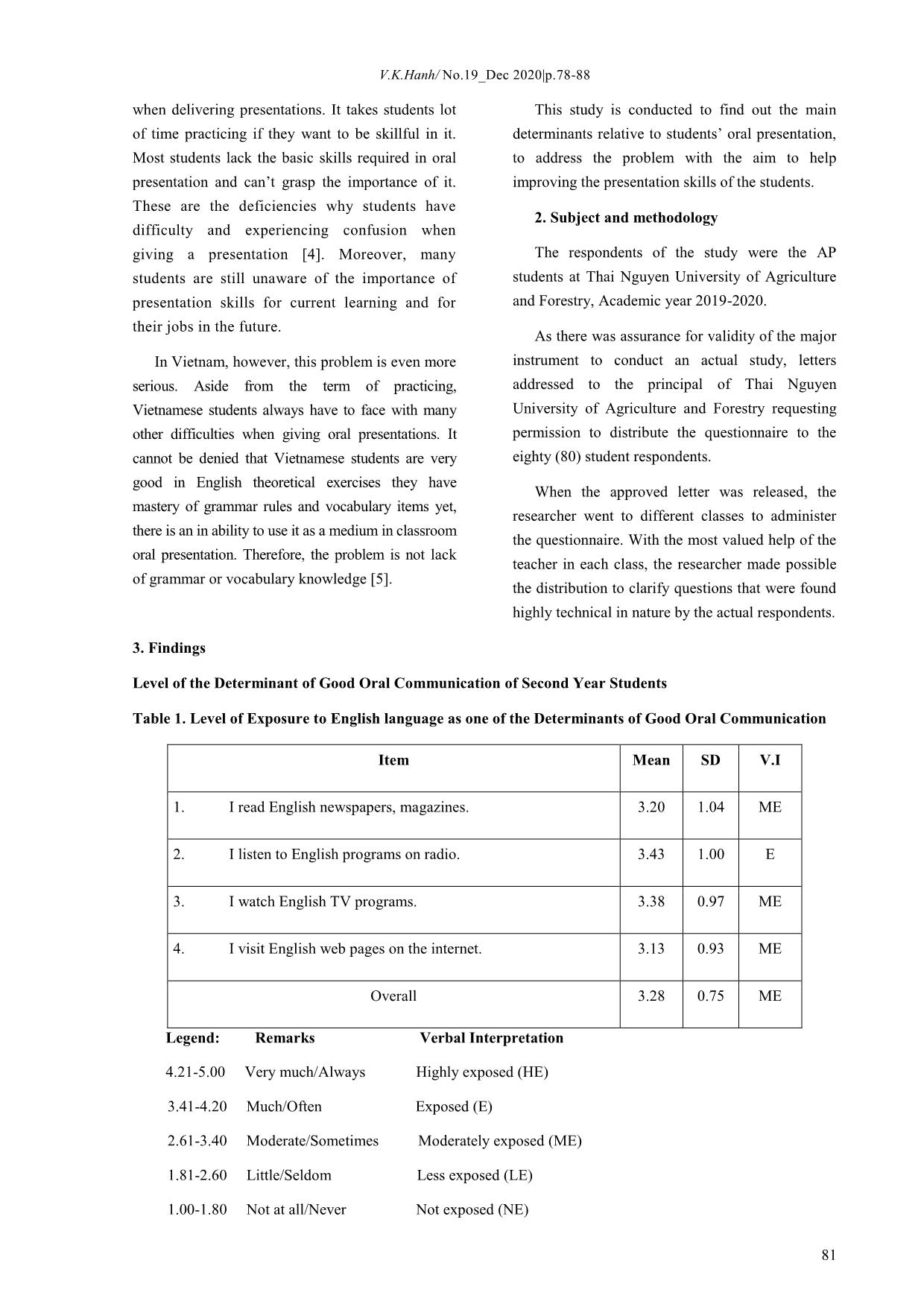
Trang 2
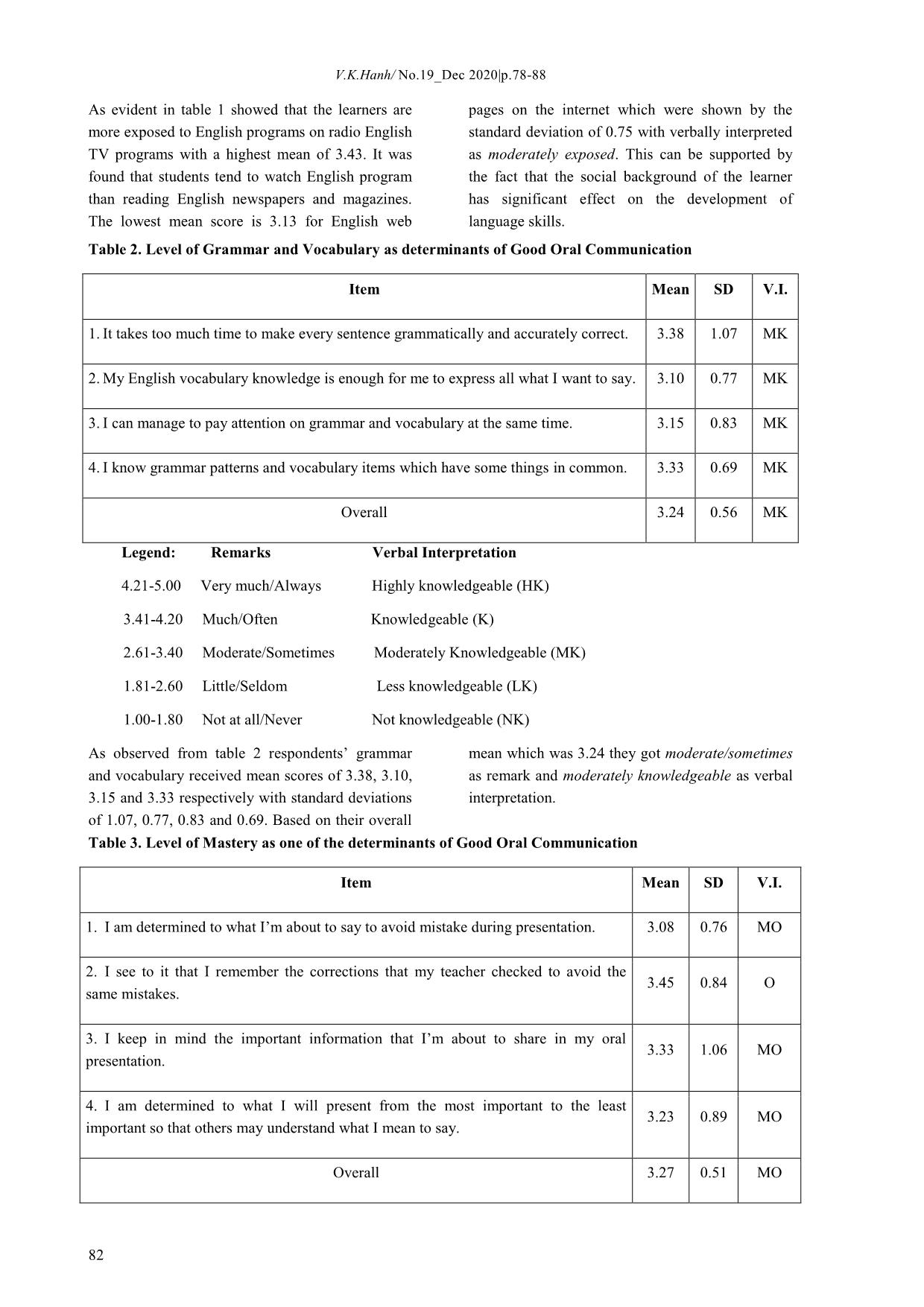
Trang 3
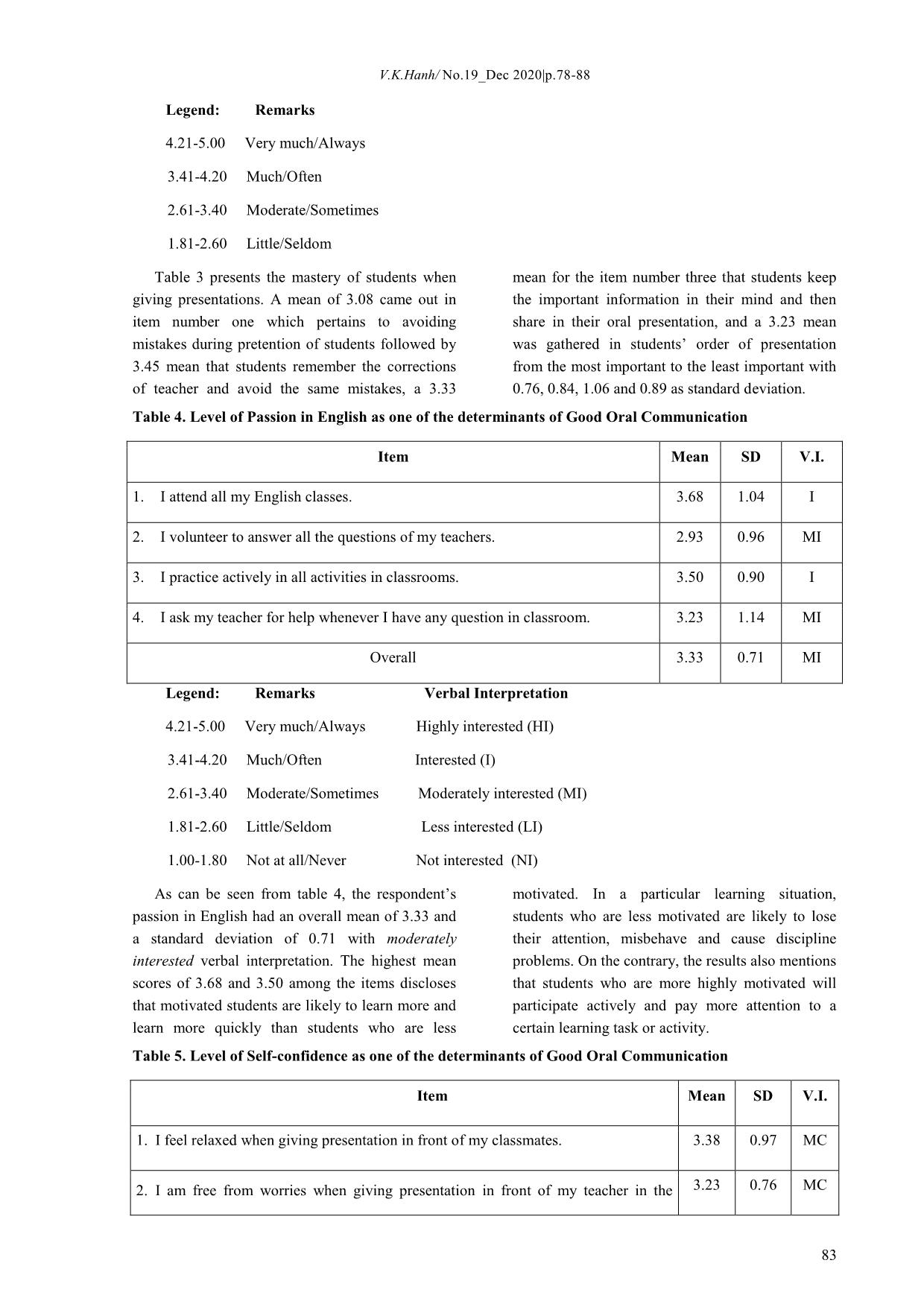
Trang 4
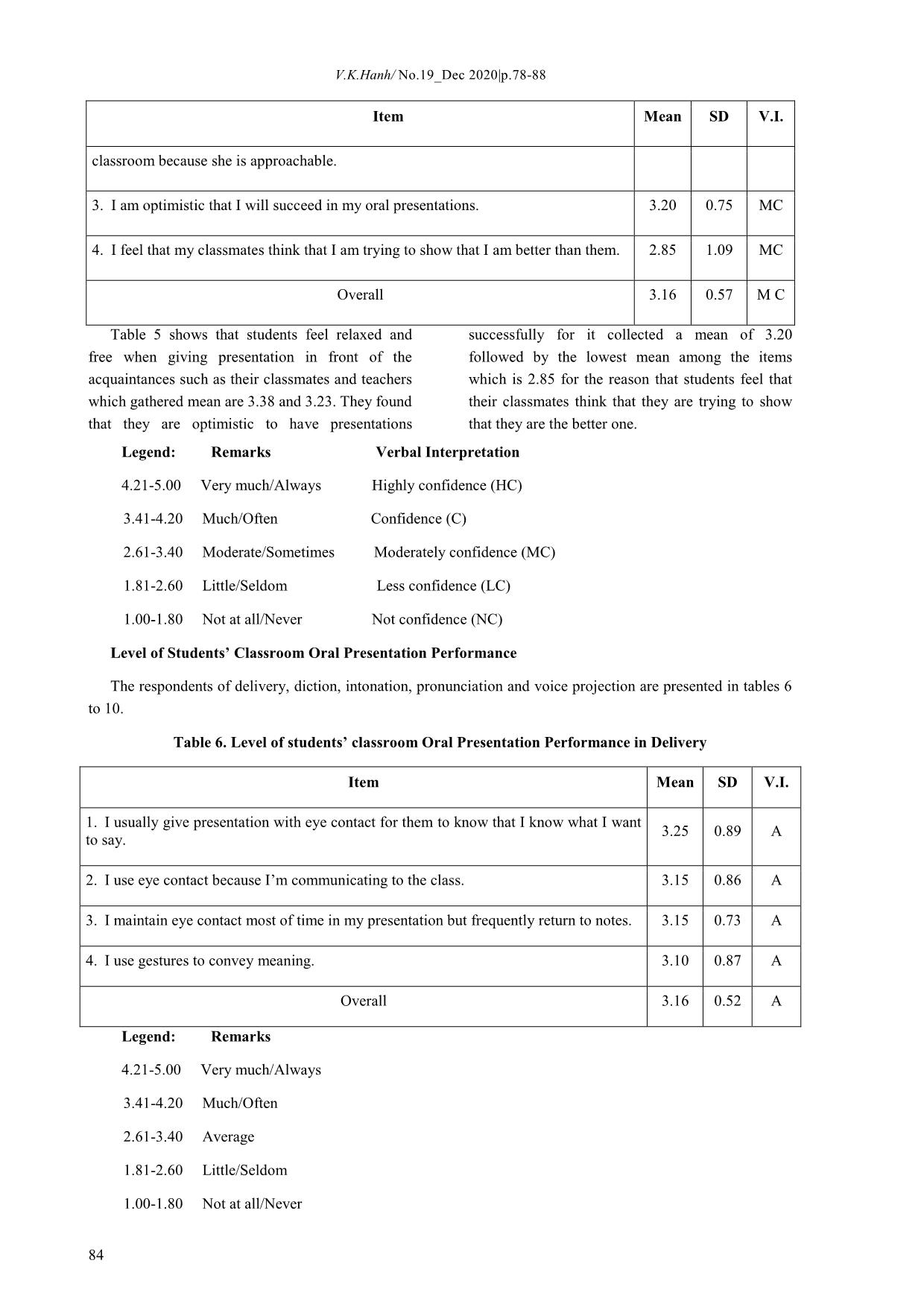
Trang 5
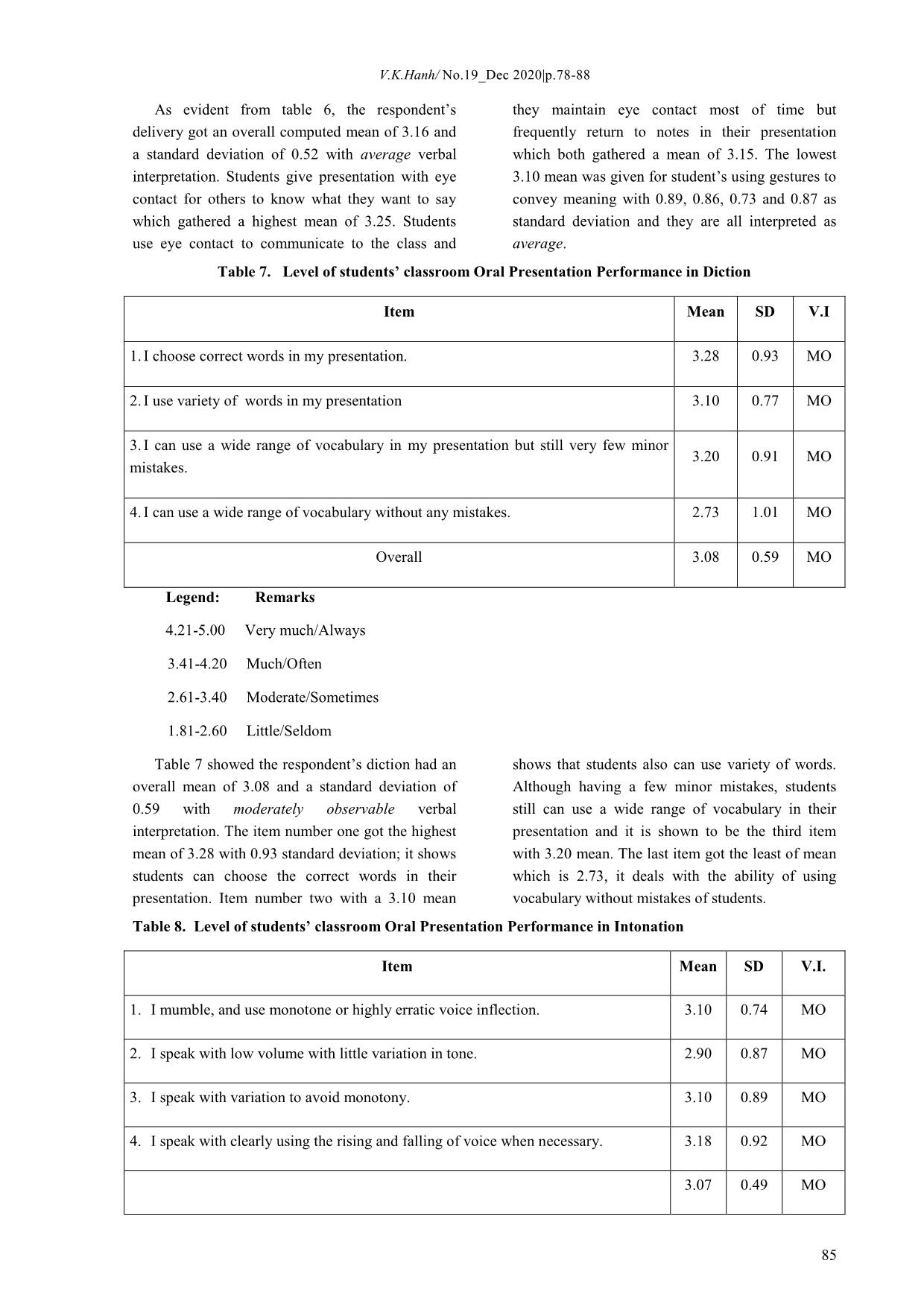
Trang 6
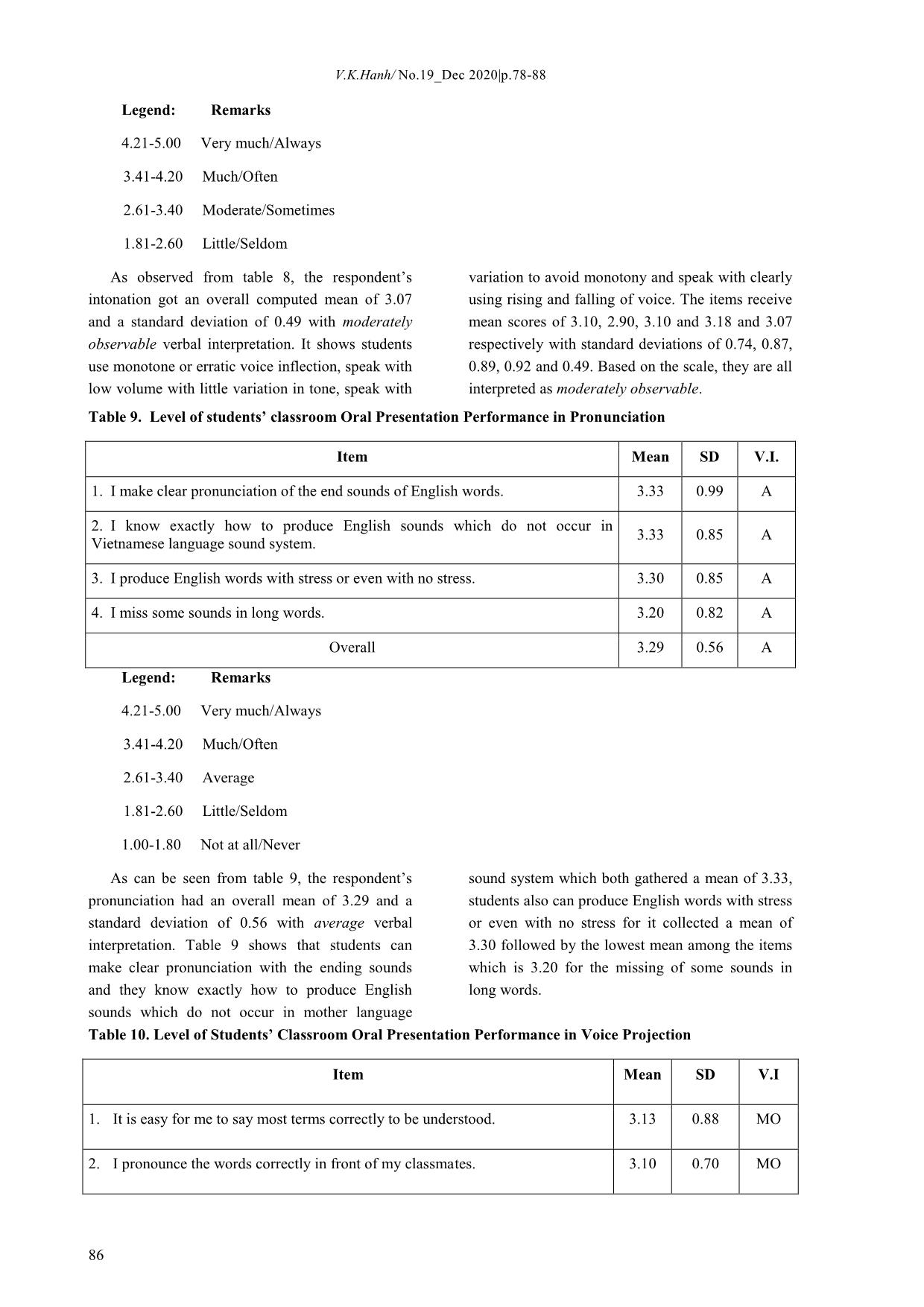
Trang 7
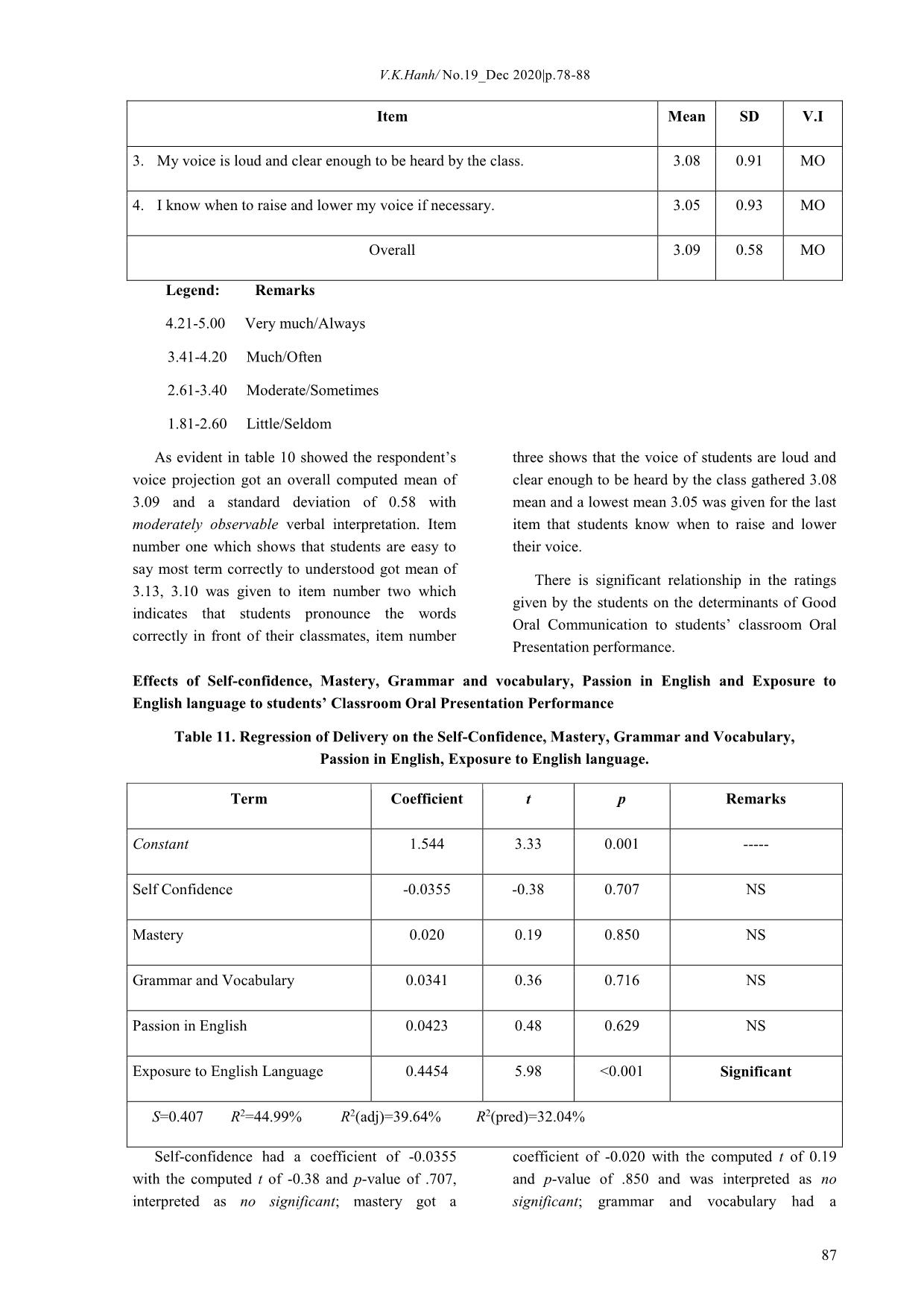
Trang 8
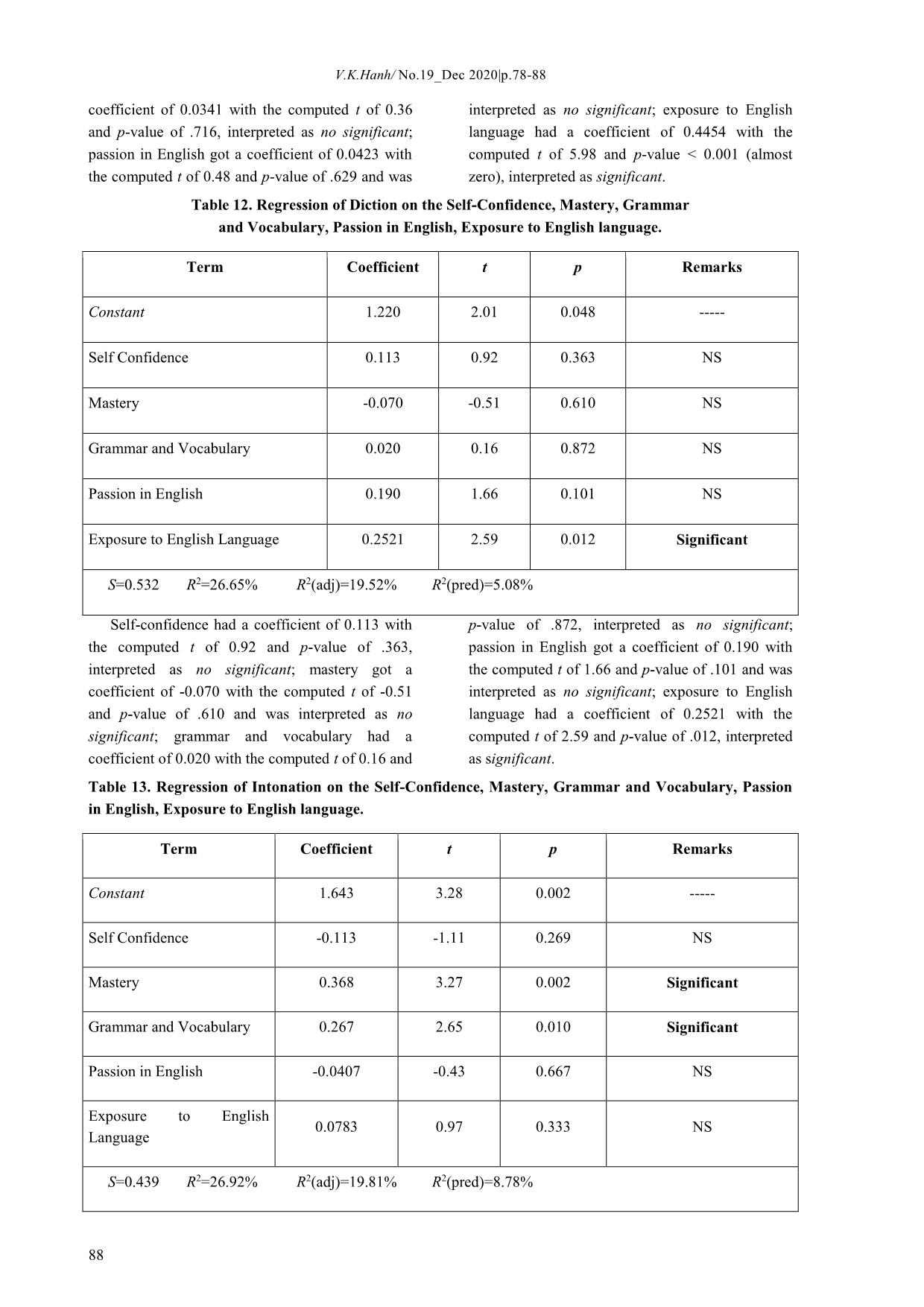
Trang 9
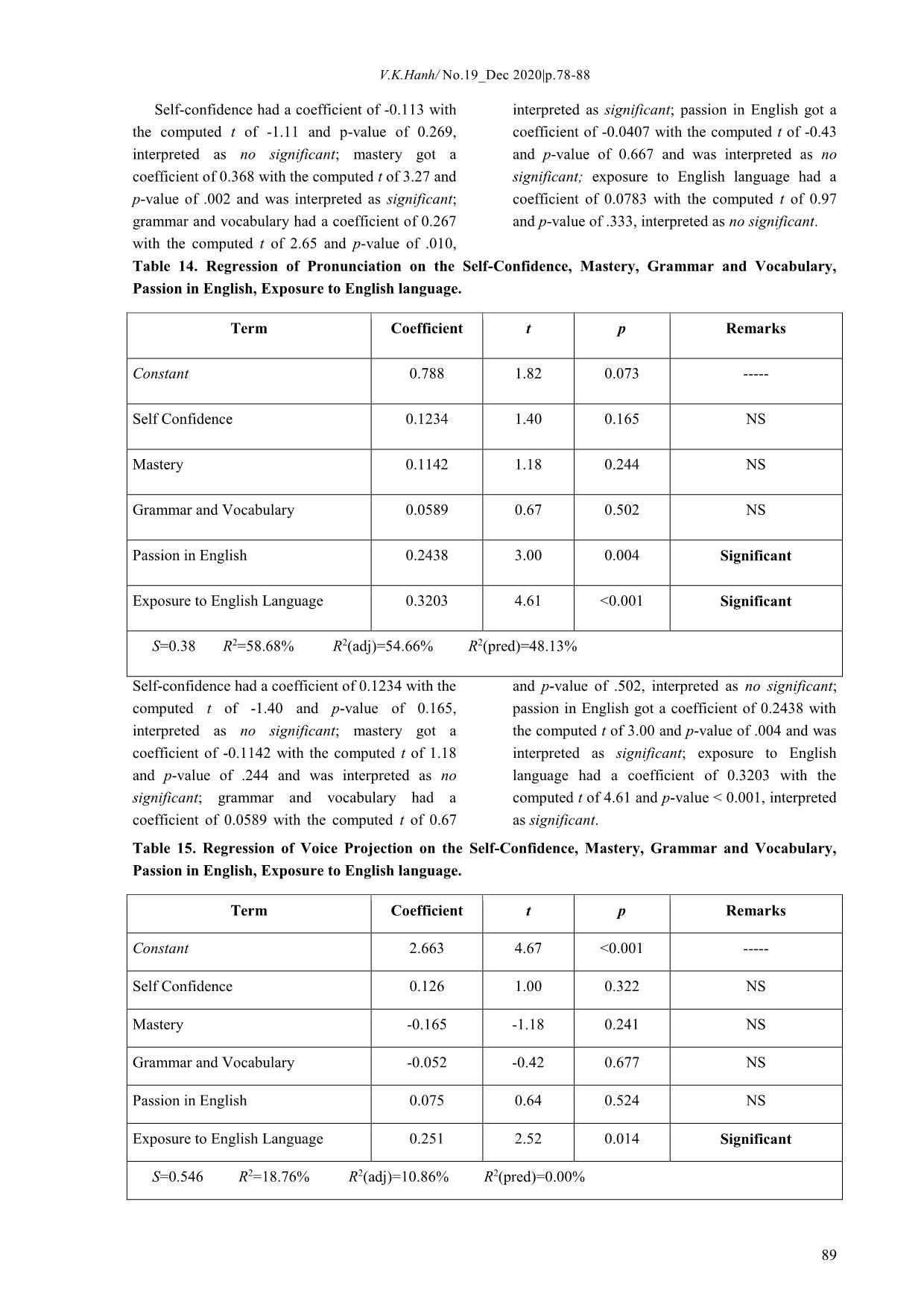
Trang 10
Tải về để xem bản đầy đủ
Tóm tắt nội dung tài liệu: Determinants of good oral communication skills for the improvement of advanced program students’ classroom oral presentation performance at thai nguyen university of agriculture and forestry
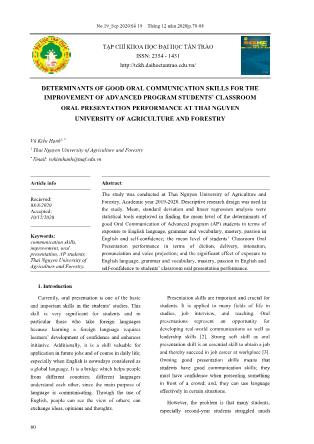
ow that I know what I want 3.25 0.89 A to say. 2. I use eye contact because I’m communicating to the class. 3.15 0.86 A 3. I maintain eye contact most of time in my presentation but frequently return to notes. 3.15 0.73 A 4. I use gestures to convey meaning. 3.10 0.87 A Overall 3.16 0.52 A Legend: Remarks 4.21-5.00 Very much/Always 3.41-4.20 Much/Often 2.61-3.40 Average 1.81-2.60 Little/Seldom 1.00-1.80 Not at all/Never 84 V.K.Hanh/ No.19_Dec 2020|p.78-88 As evident from table 6, the respondent’s they maintain eye contact most of time but delivery got an overall computed mean of 3.16 and frequently return to notes in their presentation a standard deviation of 0.52 with average verbal which both gathered a mean of 3.15. The lowest interpretation. Students give presentation with eye 3.10 mean was given for student’s using gestures to contact for others to know what they want to say convey meaning with 0.89, 0.86, 0.73 and 0.87 as which gathered a highest mean of 3.25. Students standard deviation and they are all interpreted as use eye contact to communicate to the class and average. Table 7. Level of students’ classroom Oral Presentation Performance in Diction Item Mean SD V.I 1. I choose correct words in my presentation. 3.28 0.93 MO 2. I use variety of words in my presentation 3.10 0.77 MO 3. I can use a wide range of vocabulary in my presentation but still very few minor 3.20 0.91 MO mistakes. 4. I can use a wide range of vocabulary without any mistakes. 2.73 1.01 MO Overall 3.08 0.59 MO Legend: Remarks 4.21-5.00 Very much/Always 3.41-4.20 Much/Often 2.61-3.40 Moderate/Sometimes 1.81-2.60 Little/Seldom Table 7 showed the respondent’s diction had an shows that students also can use variety of words. overall mean of 3.08 and a standard deviation of Although having a few minor mistakes, students 0.59 with moderately observable verbal still can use a wide range of vocabulary in their interpretation. The item number one got the highest presentation and it is shown to be the third item mean of 3.28 with 0.93 standard deviation; it shows with 3.20 mean. The last item got the least of mean students can choose the correct words in their which is 2.73, it deals with the ability of using presentation. Item number two with a 3.10 mean vocabulary without mistakes of students. Table 8. Level of students’ classroom Oral Presentation Performance in Intonation Item Mean SD V.I. 1. I mumble, and use monotone or highly erratic voice inflection. 3.10 0.74 MO 2. I speak with low volume with little variation in tone. 2.90 0.87 MO 3. I speak with variation to avoid monotony. 3.10 0.89 MO 4. I speak with clearly using the rising and falling of voice when necessary. 3.18 0.92 MO 3.07 0.49 MO 85 V.K.Hanh/ No.19_Dec 2020|p.78-88 Legend: Remarks 4.21-5.00 Very much/Always 3.41-4.20 Much/Often 2.61-3.40 Moderate/Sometimes 1.81-2.60 Little/Seldom As observed from table 8, the respondent’s variation to avoid monotony and speak with clearly intonation got an overall computed mean of 3.07 using rising and falling of voice. The items receive and a standard deviation of 0.49 with moderately mean scores of 3.10, 2.90, 3.10 and 3.18 and 3.07 observable verbal interpretation. It shows students respectively with standard deviations of 0.74, 0.87, use monotone or erratic voice inflection, speak with 0.89, 0.92 and 0.49. Based on the scale, they are all low volume with little variation in tone, speak with interpreted as moderately observable. Table 9. Level of students’ classroom Oral Presentation Performance in Pronunciation Item Mean SD V.I. 1. I make clear pronunciation of the end sounds of English words. 3.33 0.99 A 2. I know exactly how to produce English sounds which do not occur in 3.33 0.85 A Vietnamese language sound system. 3. I produce English words with stress or even with no stress. 3.30 0.85 A 4. I miss some sounds in long words. 3.20 0.82 A Overall 3.29 0.56 A Legend: Remarks 4.21-5.00 Very much/Always 3.41-4.20 Much/Often 2.61-3.40 Average 1.81-2.60 Little/Seldom 1.00-1.80 Not at all/Never As can be seen from table 9, the respondent’s sound system which both gathered a mean of 3.33, pronunciation had an overall mean of 3.29 and a students also can produce English words with stress standard deviation of 0.56 with average verbal or even with no stress for it collected a mean of interpretation. Table 9 shows that students can 3.30 followed by the lowest mean among the items make clear pronunciation with the ending sounds which is 3.20 for the missing of some sounds in and they know exactly how to produce English long words. sounds which do not occur in mother language Table 10. Level of Students’ Classroom Oral Presentation Performance in Voice Projection Item Mean SD V.I 1. It is easy for me to say most terms correctly to be understood. 3.13 0.88 MO 2. I pronounce the words correctly in front of my classmates. 3.10 0.70 MO 86 V.K.Hanh/ No.19_Dec 2020|p.78-88 Item Mean SD V.I 3. My voice is loud and clear enough to be heard by the class. 3.08 0.91 MO 4. I know when to raise and lower my voice if necessary. 3.05 0.93 MO Overall 3.09 0.58 MO Legend: Remarks 4.21-5.00 Very much/Always 3.41-4.20 Much/Often 2.61-3.40 Moderate/Sometimes 1.81-2.60 Little/Seldom As evident in table 10 showed the respondent’s three shows that the voice of students are loud and voice projection got an overall computed mean of clear enough to be heard by the class gathered 3.08 3.09 and a standard deviation of 0.58 with mean and a lowest mean 3.05 was given for the last moderately observable verbal interpretation. Item item that students know when to raise and lower number one which shows that students are easy to their voice. say most term correctly to understood got mean of There is significant relationship in the ratings 3.13, 3.10 was given to item number two which given by the students on the determinants of Good indicates that students pronounce the words Oral Communication to students’ classroom Oral correctly in front of their classmates, item number Presentation performance. Effects of Self-confidence, Mastery, Grammar and vocabulary, Passion in English and Exposure to English language to students’ Classroom Oral Presentation Performance Table 11. Regression of Delivery on the Self-Confidence, Mastery, Grammar and Vocabulary, Passion in English, Exposure to English language. Term Coefficient t p Remarks Constant 1.544 3.33 0.001 ----- Self Confidence -0.0355 -0.38 0.707 NS Mastery 0.020 0.19 0.850 NS Grammar and Vocabulary 0.0341 0.36 0.716 NS Passion in English 0.0423 0.48 0.629 NS Exposure to English Language 0.4454 5.98 <0.001 Significant S=0.407 R2=44.99% R2(adj)=39.64% R2(pred)=32.04% Self-confidence had a coefficient of -0.0355 coefficient of -0.020 with the computed t of 0.19 with the computed t of -0.38 and p-value of .707, and p-value of .850 and was interpreted as no interpreted as no significant; mastery got a significant; grammar and vocabulary had a 87 V.K.Hanh/ No.19_Dec 2020|p.78-88 coefficient of 0.0341 with the computed t of 0.36 interpreted as no significant; exposure to English and p-value of .716, interpreted as no significant; language had a coefficient of 0.4454 with the passion in English got a coefficient of 0.0423 with computed t of 5.98 and p-value < 0.001 (almost the computed t of 0.48 and p-value of .629 and was zero), interpreted as significant. Table 12. Regression of Diction on the Self-Confidence, Mastery, Grammar and Vocabulary, Passion in English, Exposure to English language. Term Coefficient t p Remarks Constant 1.220 2.01 0.048 ----- Self Confidence 0.113 0.92 0.363 NS Mastery -0.070 -0.51 0.610 NS Grammar and Vocabulary 0.020 0.16 0.872 NS Passion in English 0.190 1.66 0.101 NS Exposure to English Language 0.2521 2.59 0.012 Significant S=0.532 R2=26.65% R2(adj)=19.52% R2(pred)=5.08% Self-confidence had a coefficient of 0.113 with p-value of .872, interpreted as no significant; the computed t of 0.92 and p-value of .363, passion in English got a coefficient of 0.190 with interpreted as no significant; mastery got a the computed t of 1.66 and p-value of .101 and was coefficient of -0.070 with the computed t of -0.51 interpreted as no significant; exposure to English and p-value of .610 and was interpreted as no language had a coefficient of 0.2521 with the significant; grammar and vocabulary had a computed t of 2.59 and p-value of .012, interpreted coefficient of 0.020 with the computed t of 0.16 and as significant. Table 13. Regression of Intonation on the Self-Confidence, Mastery, Grammar and Vocabulary, Passion in English, Exposure to English language. Term Coefficient t p Remarks Constant 1.643 3.28 0.002 ----- Self Confidence -0.113 -1.11 0.269 NS Mastery 0.368 3.27 0.002 Significant Grammar and Vocabulary 0.267 2.65 0.010 Significant Passion in English -0.0407 -0.43 0.667 NS Exposure to English 0.0783 0.97 0.333 NS Language S=0.439 R2=26.92% R2(adj)=19.81% R2(pred)=8.78% 88 V.K.Hanh/ No.19_Dec 2020|p.78-88 Self-confidence had a coefficient of -0.113 with interpreted as significant; passion in English got a the computed t of -1.11 and p-value of 0.269, coefficient of -0.0407 with the computed t of -0.43 interpreted as no significant; mastery got a and p-value of 0.667 and was interpreted as no coefficient of 0.368 with the computed t of 3.27 and significant; exposure to English language had a p-value of .002 and was interpreted as significant; coefficient of 0.0783 with the computed t of 0.97 grammar and vocabulary had a coefficient of 0.267 and p-value of .333, interpreted as no significant. with the computed t of 2.65 and p-value of .010, Table 14. Regression of Pronunciation on the Self-Confidence, Mastery, Grammar and Vocabulary, Passion in English, Exposure to English language. Term Coefficient t p Remarks Constant 0.788 1.82 0.073 ----- Self Confidence 0.1234 1.40 0.165 NS Mastery 0.1142 1.18 0.244 NS Grammar and Vocabulary 0.0589 0.67 0.502 NS Passion in English 0.2438 3.00 0.004 Significant Exposure to English Language 0.3203 4.61 <0.001 Significant S=0.38 R2=58.68% R2(adj)=54.66% R2(pred)=48.13% Self-confidence had a coefficient of 0.1234 with the and p-value of .502, interpreted as no significant; computed t of -1.40 and p-value of 0.165, passion in English got a coefficient of 0.2438 with interpreted as no significant; mastery got a the computed t of 3.00 and p-value of .004 and was coefficient of -0.1142 with the computed t of 1.18 interpreted as significant; exposure to English and p-value of .244 and was interpreted as no language had a coefficient of 0.3203 with the significant; grammar and vocabulary had a computed t of 4.61 and p-value < 0.001, interpreted coefficient of 0.0589 with the computed t of 0.67 as significant. Table 15. Regression of Voice Projection on the Self-Confidence, Mastery, Grammar and Vocabulary, Passion in English, Exposure to English language. Term Coefficient t p Remarks Constant 2.663 4.67 <0.001 ----- Self Confidence 0.126 1.00 0.322 NS Mastery -0.165 -1.18 0.241 NS Grammar and Vocabulary -0.052 -0.42 0.677 NS Passion in English 0.075 0.64 0.524 NS Exposure to English Language 0.251 2.52 0.014 Significant S=0.546 R2=18.76% R2(adj)=10.86% R2(pred)=0.00% 89 V.K.Hanh/ No.19_Dec 2020|p.78-88 Self-confidence had a coefficient of 0.126 with 3. For skills and intonation, there were two the computed t of 1.00 and p-value of .322, statistically significant Factors, grammar & interpreted as no significant; mastery got a vocabulary, and mastery. coefficient of -0.165 with the computed t of -1.18 Since only some of the factors significantly and p-value of .241 and was interpreted as no affect the students' oral classroom, therefore the significant; grammar and vocabulary had a null hypothesis is partially supported. coefficient of -0.052 with the computed t of -0.42 References and p-value of .677, interpreted as no significant; 1. Adams, K. (2004). Modelling success: passion in English got a coefficient of 0.075 with Enhancing international postgraduate research the computed t of 0.64 and p-value of .524 and was students’ self-efficacy for research seminar interpreted as no significant; exposure to English presentations. Higher Education Research & language had a coefficient of 0.251 with the Development, 23(2), 115-130. computed t of 2.52 and p-value of 0.014, 2. A. Kanu and S. Durham (2016). Processing interpreted as significant. Public Speaking: Perspectives in Information Production and Consumption. 4. Conclusions 3. Carter, R., & Nunan, D. (2001). The Based on the findings, the following Cambridge Guide to Teaching English to Speakers conclusions were drawn. of Other Languages.Cambridge: Cambridge 1. It was found out that students’ exposure to University Press. English language was significant determinant of 4. Derwin, Tracey M. et., al. (2018). Second students’ presentation in term of voice projection, Language Accent and Pronunciation Teaching: A diction, delivery and pronunciation. Research-Based Approach 2. Students’ passion in learning the English 5. Dudley-Evans, T. (1998). Developments in language predicts their skills in oral presentation English for Specific Purposes: A multi-disciplinary approach. Cambridge University Press. performance in classroom. NHỮNG YẾU TỐ QUYẾT ĐỊNH ĐẾN KỸ NĂNG GIAO TIẾP TỐT NHẰM NÂNG CAO KHẢ NĂNG THUYẾT TRÌNH CỦA SINH VIÊN CHƯƠNG TRÌNH TIÊN TIẾN TẠI TRƯỜNG ĐẠI HỌC NÔNG LÂM THÁI NGUYÊN Vũ Kiều Hạnh Thông tin bài viết Tóm tắt Nghiên cứu được tiến hành tại trường Đại học Nông Lâm Thái Nguyên, năm Ngày nhận bài: học 2019-2020. Phương pháp mô tả được sử dụng trong nghiên cứu này. Độ 20/8/2020 trung bình, độ lệch chuẩn và phân tích quy hồi tuyến tính là phương pháp Ngày duyệt đăng: thống kê được sử dụng để tìm ra mức độ trung bình của các yếu tố quyết định đến khả năng giao tiếp tốt của sinh viên chương tình tiên tiến xét về mặt tiếp 10/12/2020 xúc với tiếng Anh, ngữ pháp và từ vựng, sự thành thạo, niềm đam mê với tiếng Anh và sự tự tin; mức độ trung bình bài thuyết trình của sinh viên xét về mặt diễn đạt, trình bày, ngữ điệu, phát âm, và chiếu bằng giọng nói; và ảnh hưởng Từ khóa: quan trọng của việc tiếp cận với tiếng Anh, ngữ pháp và từ vựng, sự thành kỹ năng giao tiếp, nâng thạo, niềm đam mê với tiếng Anh và sự tự tin trong việc trình bày bài thuyết cao, thuyết trình, sinh viên trình của sinh viên. chương trình tiên tiến, trường Đại học Nông Lâm 90
File đính kèm:
 determinants_of_good_oral_communication_skills_for_the_impro.pdf
determinants_of_good_oral_communication_skills_for_the_impro.pdf

